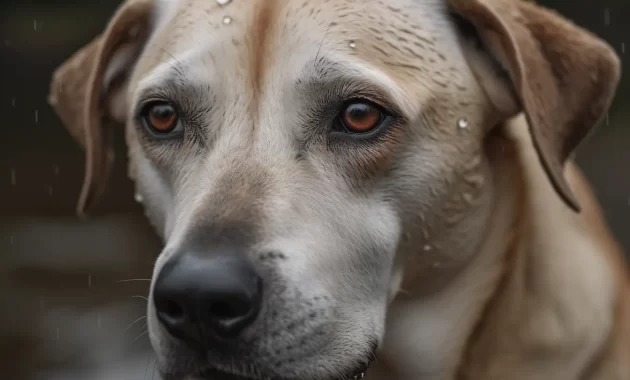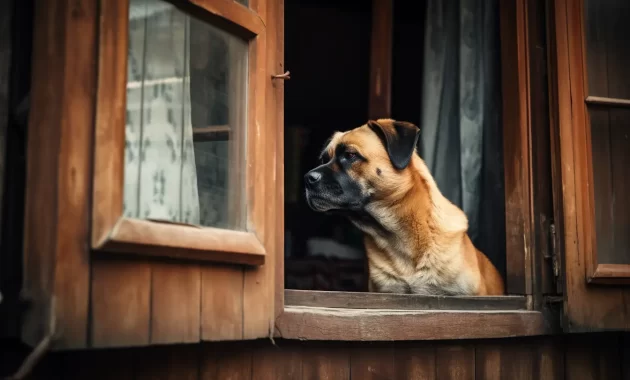
Have you ever looked into your dog’s eyes and noticed they appear cloudy or hazy?
This can be a worrying sign for pet owners, but it is essential to remember that grey eyes often indicate a treatable condition.
As a veterinary ophthalmologist, I provide insight and advice on why your pup’s eyes might be clouded.
We all want what’s best for our furry friends, so let’s explore the various causes of cloudy eyes in dogs and discuss the treatments available.
Whether you have concerns about your pup’s vision or want to ensure they stay healthy and happy, I’ll guide you on preventing this from happening again.
Table of Contents
- Potential Causes Of Cloudy Eyes In Dogs
- Diagnosing Cloudy Eyes
- Treatment Options For Cloudy Eyes
- Home Care For Cloudy Eyes
- Preventing Cloudy Eyes In The Future
- Frequently Asked Questions
- Conclusion
Potential Causes Of Cloudy Eyes In Dogs
Various conditions can cause cloudy eyes in dogs; detecting these problems as early as possible is essential.
Understanding the causes of misty eyes in canine patients ensures that proper eye hygiene is maintained and any underlying issues are managed appropriately.
Cataracts are among the most common causes of cloudiness in dogs’ eyes.
This condition occurs when there is a change in the structure of the lens, resulting in vision impairment. Depending on the severity, cataracts may cause complete blindness or partial vision loss.
Other common causes of cloudy eyes include glaucoma, uveitis, corneal dystrophy, and dry eye syndrome.
A thorough eye examination is necessary to identify any underlying issues causing the cloudiness and accurately diagnose any of these conditions.
Further testing will be required to confirm an accurate diagnosis and recommend an appropriate treatment plan if any problems are detected during this exam.
Early detection and management are vital for ensuring your dog’s long-term eye health.
Diagnosing Cloudy Eyes
When a pet’s eyes appear cloudy, it is essential to assess their symptoms to determine the underlying cause.
As a veterinary ophthalmologist, I recommend that owners observe their pets for changes in their behaviour or physical state.
This includes signs of eye trauma such as redness, swelling, discharge, or pain.
It is also essential to look for any other symptoms related to an underlying condition, such as loss of vision or changes in the appearance of the pupils.
To make a diagnosis, a complete ocular exam should be conducted by a qualified veterinarian.
This may include a thorough evaluation of eye structures and function and tests such as tear production testing and visual acuity assessment.
Further treatments may be necessary depending on the exam results and any additional tests performed.
Diagnosing and treating any underlying conditions associated with cloudy eyes is essential to ensure your pet’s health and comfort.
You can provide your beloved pet with the best possible quality of life with proper care and regular checkups.
SEE ALSO
How You Can Tell If Your Border Collie Has Mental Problems
What Cavalier King Charles Spaniel Owners Need to Know About Their Dogs’ Health Before Bringing Them Home
Treatment Options For Cloudy Eyes
Now that we have looked at the diagnosis of cloudy eyes in dogs let us explore treatment options for this condition.
First, we must look at any dietary changes that may be necessary.
Depending on the underlying cause of the cloudy eyes, your veterinarian can recommend dietary modifications to help improve the health of your dog’s eyes.
Certain environmental factors may also contribute to this condition and should be addressed to reduce their effects.
This could include ensuring adequate shade and ventilation in their area, limiting exposure to potential irritants such as dust or pollen, and providing sufficient access to clean water.
Finally, you may need to consider additional treatments for your pet depending on the severity of their condition and underlying cause.
Your veterinarian will work with you to determine a treatment plan tailored to your pet’s needs.
This might include topical or eye drops, nutritional supplements and anti-inflammatory medications if needed.
With appropriate care, most canine cloudy eyes can be managed effectively with minimal disruption to your pet’s vision or quality of life.
Home Care For Cloudy Eyes

If your pet’s eyes have become cloudy, taking the necessary steps for home care and prevention is essential.
This section will explore the best practices for keeping your pet’s eyes healthy and clear.
Good nutrition and eye hygiene are critical to maintaining healthy eyesight in pets. A balanced and nutritious diet with proper vitamins and minerals will help keep your dog’s vision at its optimal level.
Additionally, cleaning the fur surrounding the eyes regularly is essential in keeping eye irritation at bay.
When cleaning around your pet’s eyes, it is essential to use only products specifically designed for animals.
For instance, you can purchase a mild shampoo that is gentle on the skin to reduce infection or inflammation of the area.
Additionally, a warm compress over the eyes can help reduce cloudy vision caused by irritants or allergies.
| Nutrition | Eye Hygiene |
|---|---|
| Balanced Diet | Clean Fur Regularly |
| Proper Vitamins/Minerals | Use Animal-Specific Products |
| — | Warm Compress for Irritation/Allergies |
As you can see from this table, taking good care of your pet’s vision requires nutritional support and regular eye hygiene practices.
Keeping these two components in check will ensure their vision remains strong and clear throughout life.
Preventing Cloudy Eyes In The Future
Having discussed the home care for cloudy eyes in your dog, it is essential to consider how we can prevent this issue in the future.
To do this, we must first understand what causes cloudy eyes.
While genetics are a significant factor, dietary changes and environmental factors can also play a role.
Dietary changes are an essential part of any prevention plan.
Dogs that receive insufficient nutrition may be more prone to developing eye issues like cloudiness or dryness.
To help prevent this, be sure to feed your pet a balanced diet that includes all the necessary vitamins and minerals that they need.
In addition to dietary changes, environmental factors should not be overlooked regarding prevention strategies.
For example, exposure to smoke or chemicals can cause eye inflammation and cloudiness over time.
Keep your pet away from areas with high air pollution or chemical fumes to avoid these issues.
Notably, there is no one-size-fits-all approach to preventing cloudy eyes in dogs.
However, with careful monitoring and proactive strategies such as dietary changes and avoiding environmental triggers, you can significantly reduce your pet’s risk of developing this condition.
Frequently Asked Questions
How Do I Know If My Dog’s Eyes Are Cloudy?
Identifying changes in your dog’s eye health can be challenging to do on your own. Still, if you suspect they may have cloudy eyes, it’s essential to consult a veterinary ophthalmologist.
Various conditions and diseases can cause cloudy eyes in dogs, so git setting an accurate diagnosis is essential.
Symptoms of cloudy eyes in dogs include a hazy or white film over the eye’s lens, decreased vision, sensitivity to light and blinking or squinting more often than usual.
If you notice any of these symptoms in your pet, contact your vet for an appointment with an ophthalmologist who can assist in determining the underlying cause so that proper treatment can be prescribed.
Is Cloudy Eyes In Dogs A Serious Condition?
Cloudy eyes in dogs can be alarming for pet parents, but it is not necessarily severe.
In most cases, cloudy eyes are caused by age-related changes or minor irritations such as dust or debris.
However, there are some uncommon causes of cloudy eyes in dogs that a veterinary ophthalmologist should address.
These include cataracts, which can result from injury or inherited conditions, and corneal dystrophy, caused by an abnormality in the protein layer of the eye’s surface.
Regardless of the cause, your vet can recommend the best treatment for your furry friend.
What Are The Risk Factors For Cloudy Eyes In Dogs?
Various risk factors can cause cloudy eyes in dogs; pet owners must be aware of these.
Genetic predisposition is one factor that can lead to cloudy eyes in dogs, so it’s essential to check your dog’s breed for any known history of the condition.
Environmental factors such as exposure to dust, pollen or other irritants, and direct sunlight can also contribute.
As an ophthalmologist, I always recommend pet owners take all necessary precautions regarding their furry friend’s eye health.
Is There A Cure For Cloudy Eyes In Dogs?
The eyes of our beloved canine companions can sometimes be shrouded in a cloud of mystery.
However, symptom detection is critical for successfully treating cloudy eyes in dogs.
Ophthalmologists have found that topical eye drops are often the most effective solution for curing this condition and restoring clear vision.
So if you suspect your pup may be suffering from cloudy eyes, don’t hesitate to reach out to your trusted vet. We’ll work together to help bring your pup’s vision back into focus and ensure they’re seeing again!
Are There Any Lifestyle Changes I Should Make To Help Prevent Cloudy Eyes In My Dog?
Making a few lifestyle changes for your dog can go a long way in preventing cloudy eyes.
MaiIt’sntaining a balanced diet with appropriate levels of vitamins and minerals and an exercise regimen that suits your pup’s age and size is essential.
In addition, please pay close attention to the nutrition changes you make and ensure they suit your breed.
With these simple steps, you can help keep your dog’s eyes healthy and free from cloudiness.
Conclusion
Cloudy eyes in dogs can be severe, but it is often treatable with early diagnosis and proper treatment.
As a pet owner, you must know this condition’s signs and symptoms and take preventive steps to reduce your dog’s risk.
Regular checkups with a veterinarian ophthalmologist are essential for keeping tabs on your dog’s eye health.
With careful monitoring and appropriate treatment, you can help ensure your pet’s vision stays healthy and clear.




